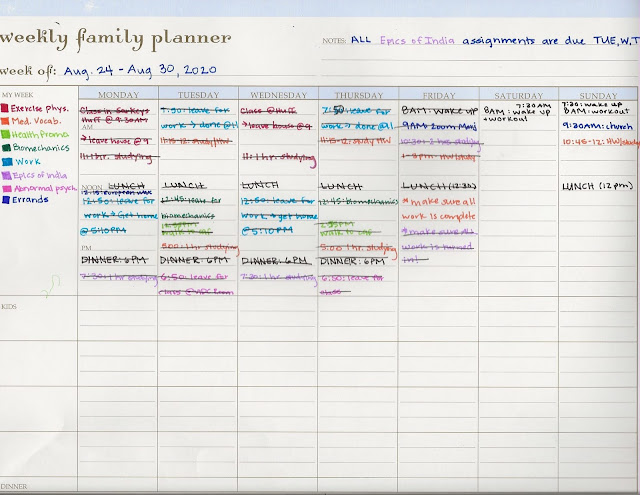Time Strategies
TIME STRATEGIES
As I look back on the schedule that was based around times that I thought would work best for me, I found that I need to be more determined in getting my work done on the actual days that are on my schedule. I found on Wednesday, that after I got off work and was done with classes, that I felt too tired to work on assignments for two hours. Since I have already overbooked myself for the semester, I need to space out those two hours among two separate days, instead of all on Wednesday. So, I have decided to do 1 hour of homework/readings on Wednesday, before I eat lunch, then 1 hour on Thursday at the same time. This way, I won't feel like I have a ton of work to do in one sitting. I think managing my time in the midst of covid-19 has been more difficult than usual because I do have trouble studying at home. When I study in my room, I actually find anything other than what I'm supposed to be doing. I need to find somewhere I can feel comfortable and focused during the times I complete these assignments (if anyone has any locations they find useful while studying, please let me know)!
I decided to take a look at these two articles: Four Questions to Help you Overcome Procrastination and How to Build a Realistic Study Plan That You'll Actually Stick To.
While reading the procrastination article, I found it helpful knowing that other people experience trouble when figuring out where to start. Luckily, for this class, everything is basically laid out for us, and we don't have to go through any difficult navigation to find assignments, although, some projects might force us to crawl outside of our comfort zone, which means that it'll be harder to get started. Procrastination is natural, and I'm sure we have all experienced it, but once we get started on a task, sometimes it turns out to be a lot easier than expected! The step that helped me the most in this article is learning how to mentally break up the project into sections, and choose the easiest one to start on. A lot of the time, I tell myself to start on the harder problem at hand first, but it makes sense to get the easier task done first, to get it out of the way. I think that realizing what you can lose from procrastinating is a huge factor, which we oftentimes don't consider. In fact, I actually wrote down these four questions to keep on my desk to have a reminder before I get started on a project.
The article covering how to create a realistic study plan that you'll actually stick to really hit home for me. I view myself as a super-organized person, but a lot of the time, I'll have a great schedule and not actually follow it. Sometimes I think I make things too detailed, so words can easily get lost in translation. It is refreshing to hear that there are simple ways to create a habitual study schedule. I think I need to realize that I would benefit more from shorter study sessions. I have all of the planning, organizing, and realizing what times work best for me down, but the focus and drive are where I get lost. If I were to cut down and spread out the number of hours I study in a day, I think I would get more out of each session. I think the goals section of this article is key. We need an end goal to stay motivated and also my favorite part is checking items off of a list (Ahh so satisfying). Below is a photo of the daily planner I use and check off as I go:
(Image Information: Personal photo of my weekly planner; Photo from August 29, 2020).



Comments
Post a Comment